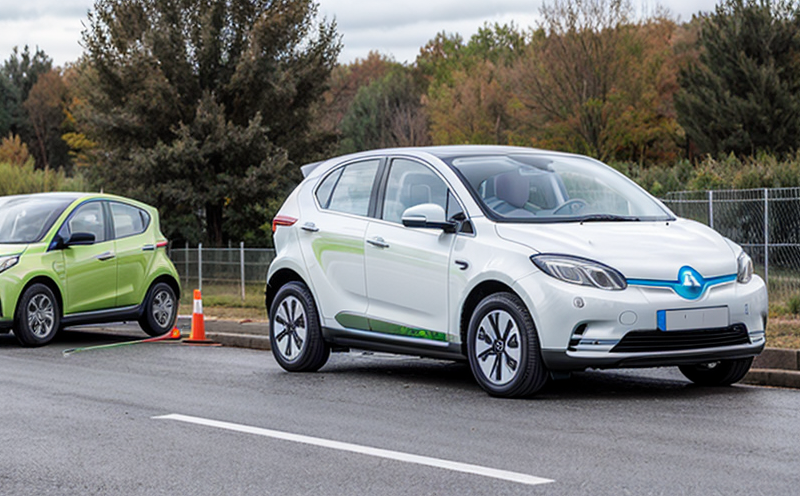IEEE 1725 EV Battery Testing for Mobile and Portable Applications
The IEEE Standard P1725, titled "Recommended Practice for the Safety Assessment of Lithium Batteries in Electric Vehicles," provides a comprehensive framework for evaluating the safety performance of lithium-ion batteries used in electric vehicles (EVs). This standard is particularly relevant to mobile and portable applications where battery integrity and safety are paramount. Our laboratory specializes in conducting IEEE 1725-compliant tests that ensure the highest level of safety standards, which are critical for the development, manufacturing, and quality assurance of EV batteries.
The testing process outlined by IEEE P1725 encompasses a series of rigorous procedures designed to identify potential hazards associated with lithium-ion batteries. These tests are essential not only for regulatory compliance but also for enhancing product reliability and durability in harsh environments often encountered during mobile use. The standard covers various aspects including thermal, mechanical, electrical, and abuse testing.
Thermal stability tests assess the battery's ability to withstand high temperatures without failing catastrophically. Mechanical strength tests evaluate how well a battery holds up under physical stress such as drop impacts or compression forces. Electrical performance checks focus on ensuring consistent charge-discharge cycles while maintaining safe voltage levels throughout their lifecycle. Abuse testing simulates real-world scenarios like overcharging, short circuits, and even fire exposure.
Our state-of-the-art facilities employ advanced instrumentation capable of replicating these challenging conditions accurately. This includes specialized chambers for controlled temperature exposures, drop testers for mechanical impact assessments, sophisticated battery analyzers for electrical behavior monitoring, and sophisticated calorimeters to measure heat generation during abuse events.
By adhering strictly to IEEE 1725 guidelines, we provide clients with robust evidence regarding the safety characteristics of their products. The results from these tests can help manufacturers make informed decisions about design improvements or material substitutions aimed at preventing accidents and extending product lifespans.
The importance of such testing cannot be overstated in light of recent incidents involving lithium-ion batteries in consumer electronics and electric vehicles. Regulatory bodies around the world are increasingly enforcing stringent safety regulations to protect consumers from potential risks posed by faulty batteries. By partnering with us, businesses can stay ahead of these trends while ensuring their products meet all necessary requirements.
| Standard Number | Title |
|---|---|
| IEEE P1725 | Recommended Practice for the Safety Assessment of Lithium Batteries in Electric Vehicles |
Applied Standards
- IEEE P1725: Recommended Practice for the Safety Assessment of Lithium Batteries in Electric Vehicles
Benefits
- Ensures compliance with international safety standards
- Identifies and mitigates potential hazards early in the development process
- Enhances product reliability through rigorous testing protocols
- Provides data for informed decision-making regarding design modifications
- Promotes safer products for consumers, reducing liability risks
International Acceptance and Recognition
The IEEE P1725 standard has gained widespread acceptance among manufacturers of electric vehicles and related components due to its comprehensive approach towards ensuring lithium-ion battery safety. Many countries have incorporated this practice into their national regulations, reflecting the growing emphasis on public safety in the transportation sector.
Our laboratory is regularly accredited by leading certification bodies who recognize our commitment to adhering strictly to IEEE P1725 guidelines. This accreditation not only enhances client trust but also simplifies the process of achieving regulatory approval for new products or modifications to existing ones.
With increasing global focus on sustainable transportation solutions, organizations involved in this industry need reliable partners who understand both technical requirements and market demands. By leveraging IEEE P1725-compliant testing services, companies can demonstrate their dedication to producing safe, efficient, and environmentally friendly products that meet current standards while being prepared for future developments.





